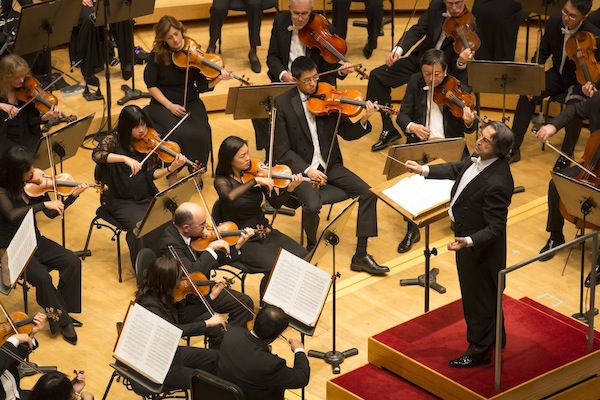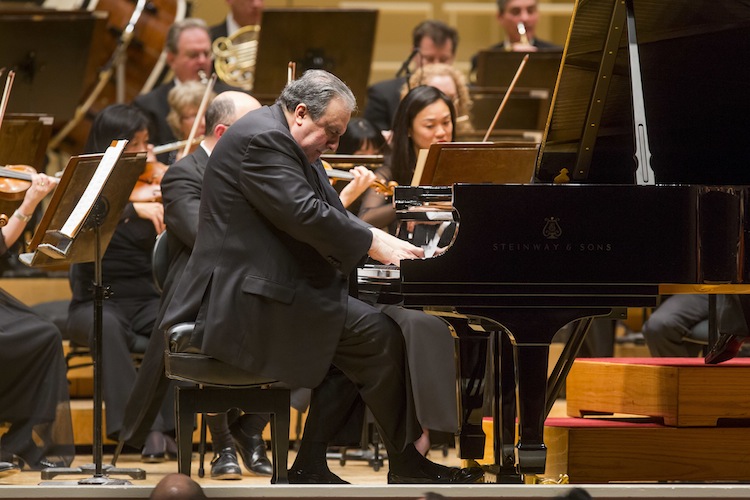Muti, CSO serve up winning account of rare Tchaikovsky gem

“How many symphonies did Tchaikovsky write?” asks the professor.
“Three,” answers a student proudly. “The Fourth, the Fifth and the Sixth.”
An old conservatory joke but one that is reflective of the fact that the Russian composer’s early symphonies are still among his few works that remain rare concert-hall visitors.
Riccardo Muti has returned for two weeks of Chicago Symphony Orchestra concerts in a busy month that will also see a trip to Carnegie Hall, principal horn auditions and the announcement of the CSO’s 2015-16 season.
Muti’s first program of 2015 offered another installment in his season-long survey of the complete Tchaikovsky symphonies (including Manfred) with the composer’s Symphony No. 1.
Of Tchaikovsky’s three lesser-played works in the genre, his First Symphony is the most successful and the most satisfying. The results are somewhat surprising, since the young composer worked so feverishly at this debut large work for orchestra that his Op. 13 resulted in the first of many nervous breakdowns (he vowed never to work late at night again).
Subtitled “Winter Daydreams,” the work has no specific program despite similarly atmospheric descriptions of the opening two movements. While not a work of roiling drama like his better known late symphonies, the First has the most memorable material of the early three, and is scored with characteristic flair and individuality. The First is also a more cohesive and unified effort than the Second and Third, mixing indelible melodies, light charm and a thoughtful melancholy that somehow seems to evoke something of the winter season.
The CSO’s music director is often at his best in neglected curios of the Late Romantic era and so it proved again with Thursday night’s performance. “Winter Daydreams” may not be a masterpiece but the high-sheen and hugely characterful performance Muti and the orchestra delivered certainly made it sound like one.
The Italian conductor underlined the dynamic contrasts and unorthodox, even bizarre, scoring details throughout in a way that suited this flowing, atmospheric score without ever sounding pedantic. In the opening movement (“Daydreams of a Winter Journey”) clarinetist Stephen Williamson conveyed the folksy ease of the secondary theme, and Muti and the players brought a symphonic strength and punch to the development section.
The evocative second movement (“Land of Desolation, Land of Mists”) was quite sensational with Eugene Izotov’s long-breathed oboe solo decorated with graceful arabesques by the superb guest flutist Lorna McGhee. The untitled Scherzo—a WFMT drive-time favorite for decades—is the most “wintry” of the four movements and was given fine bustling energy. The middle section offers one of Tchaikovsky’s most beguiling tunes and Muti and the strings gave the waltz-like theme a delicious lilt.
Tchaikovsky mines surprising riches from the unpromising five-note main theme of the finale and the strange moments, such as the sudden pauses and isolated timpani notes, were given their impact while Muti ratcheted up the cumulative excitement and energy to a headlong coda. This vivid performance was the finest of Muti’s Tchaikovsky cycle to date and made a worthy start to the new year for the music director and orchestra.
On the first half was Brahms’ Piano Concerto No. 2 with Yefim Bronfman as soloist.
Bronfman owns this large-scale, multifaceted work like few other pianists and has the power and easy virtuosity to tackle its myriad demands.
Perhaps a bit too easily. The pianist played with customary strength and assurance Thursday night yet there was more than a hint of routine in his performance. Everything was firmly projected and polished by the soloist—a rough start to the Scherzo apart—yet generalized in a sturdy somewhat faceless manner. Led by Muti, the orchestra lent fluent, highly refined support yet the piano and orchestra seemed to inhabit cordial yet separate parallel universes.
John Sharp’s beautifully burnished cello solo launched the Andante superbly, and here the performance hit its stride, Bronfman playing with tender expression and Muti and colleagues lending elegant, flowing support. The final movement can often feel too lightweight for the preceding sections but Bronfman gave it an extra weight allied to nimble articulation, making for a spirited finale with equally vital orchestral playing.
The program will be repeated 8 p.m. Saturday. cso.org; 312-294-3000.
Posted in Uncategorized





